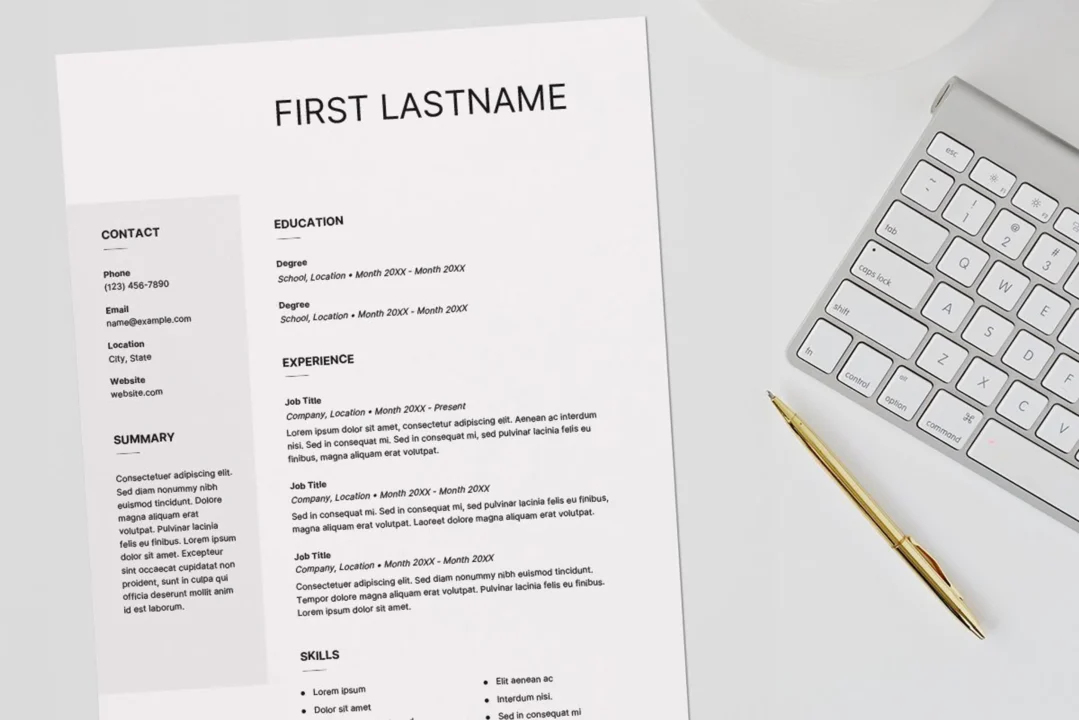

Understanding International Resume Standards
Creating a resume for abroad companies necessitates a thorough understanding of international resume standards. The expectations for resume format, length, and content can vary significantly across different countries, making it vital to customize your resume to align with the specific norms of your target country. By recognizing these differences, you can improve the chances of your application being well-received, aiding your goal of securing a job overseas.
One of the primary distinctions in international resumes lies in the format. While a resume for companies in the United States typically focuses on brevity, often limited to one page, European and some Asian countries might anticipate more comprehensive documents, extending to two or even three pages. Additionally, the layout and design of resumes might differ, with some cultures preferring a clean, modern aesthetic and others favoring more traditional layouts.
Information inclusion is another critical aspect where international resumes vary. For example, resumes in many European countries customarily include a photo, date of birth, nationality, and even marital status. Conversely, such details are generally excluded in U.S. resumes due to anti-discrimination laws. Understanding what information is expected can prevent your resume from being overlooked or rejected due to cultural missteps.
Researching the specific resume requirements of the country you are applying to is essential. Resources such as country-specific recruitment sites, career-focused forums, and international career advisors can offer valuable insights. Additionally, consulting examples of international resume templates tailored to your target region can provide guidance on how to properly format and structure your application. Websites like Europass for European resumes or JResume for Japanese resumes can be particularly helpful.
By acknowledging and adhering to the diverse standards between domestic and international resumes, you ensure your application not only meets but exceeds the expectations of potential employers abroad. This adaptability reflects well on your understanding and respect for global professional norms, which can significantly enhance your job prospects on the international stage.
Highlighting Your Skills and Experience Effectively
Creating a compelling resume for abroad companies hinges on how effectively you showcase your skills and experiences. It is essential to strike a balance between highlighting both hard and soft skills to present yourself as a well-rounded candidate. When listing your hard skills, focus on precisely those that are directly relevant to the job you are targeting. These might include technical proficiencies, industry-specific knowledge, or certifications that add value to your profile. Use examples such as mastering a programming language, proficiency in project management software, or fluency in multiple languages.
Equally important are your soft skills, which are crucial in a global work environment. Attributes like communication, teamwork, problem-solving, and adaptability can significantly appeal to international employers. For example, you could state your experience in leading cross-cultural teams or resolving conflicts in multicultural settings. These examples help demonstrate your capability to thrive in diverse and dynamic workspaces.
When detailing your experiences, employing strong action verbs and quantifiable achievements can make a substantial impact. Phrases like “spearheaded,” “initiated,” “enhanced,” and “streamlined” not only convey what you did but also the proactive manner in which you accomplished it. Moreover, quantifying your accomplishments offers a clear picture of your contributions. Descriptions such as “increased sales by 20%,” “reduced operational costs by $50,000,” or “managed a team of 15 associates” provide concrete evidence of your abilities.
Tailoring your resume for each job and company is paramount. Research the company’s culture, projects, and priorities, and reflect this understanding in your resume. One effective strategy is using keywords from the job description. This approach not only aligns your qualifications with the employer’s needs but also helps in passing through Applicant Tracking Systems (ATS), which scan resumes for specific terms. By crafting your resume this way, you enhance your chances of securing an interview, showcasing your genuine interest and fit for the role.
Emphasizing Global Competence and Intercultural Skills
When targeting international job opportunities, it is crucial to highlight your global competence and intercultural communication skills on your resume. Employers seeking candidates for positions abroad are often looking for individuals who can seamlessly integrate into diverse work environments and effectively navigate cross-cultural interactions. Showcasing these competencies can significantly enhance your candidacy.
Begin by elaborating on any international experience you possess. This could include studying abroad, participating in exchange programs, or working within multicultural teams. For instance, if you studied in a foreign country, detail the specific skills you gained—such as adaptability, resilience, and fluency in another language. Mentioning any courses or projects that had an international focus can further demonstrate your global awareness.
Language skills are another vital component to emphasize. Clearly list any languages you speak, along with your proficiency levels. Being multilingual is a strong asset for companies operating across borders and can make you a more appealing candidate.
Cultural adaptability is often a primary concern for international employers. Illustrate your ability to thrive in diverse cultural settings by sharing specific experiences, such as collaborating with colleagues from different backgrounds or managing multicultural projects. Discuss the positive outcomes of these interactions and how they have prepared you to work effectively in a global context.
To ensure that these skills and experiences stand out, strategically incorporate them into various sections of your resume. You can create a dedicated section titled “Global Experience” or “International Competence.” Alternatively, intersperse these details throughout the descriptive bullet points under your job roles, education, or skills sections. This holistic integration will portray you as a well-rounded candidate, capable of excelling in an international work environment.
Undoubtedly, highlighting global competence and intercultural skills can make your abroad resume more competitive and appealing to potential employers worldwide.
Best Practices for Formatting and Presentation
When crafting a resume for an international audience, it’s crucial to prioritize both formatting and presentation. A polished abroad resume not only highlights your qualifications effectively but also ensures clarity, making it easier for recruiters to quickly glean relevant information. A clean and professional design is vital; opt for easily readable fonts such as Arial or Calibri, and utilize a consistent font size, preferably 11 or 12 points, throughout your document.
Clear section headings are instrumental in providing structure. Typical sections might include Contact Information, Professional Summary, Work Experience, Education, Skills, and Certifications. These segments help in organizing your content and make it navigable. Ensure your resume is concise, typically one to two pages in length. This brevity is especially critical when applying to international companies that may sift through hundreds of applications. Bullet points are your ally for maintaining succinctness; they facilitate a quick read and allow you to focus on key achievements and responsibilities.
Avoid peppering your resume with industry-specific jargon or acronyms that might not resonate outside your home country. Contexts can vary widely across borders, and what makes perfect sense domestically might puzzle an international employer. Instead, use clear and universally understandable language to describe your roles and accomplishments. Emphasize transferable skills and experience that can be applied across various international contexts.
Lastly, meticulous proofreading cannot be overstated. Typos and grammatical errors can detract significantly from your professional image. Enlist a trusted colleague or mentor with experience in international hiring to review your resume. Their insider perspective can provide invaluable feedback, helping you polish the document effectively. Employing these best practices will enhance your abroad resume, making it a compelling and standout application to international employers.